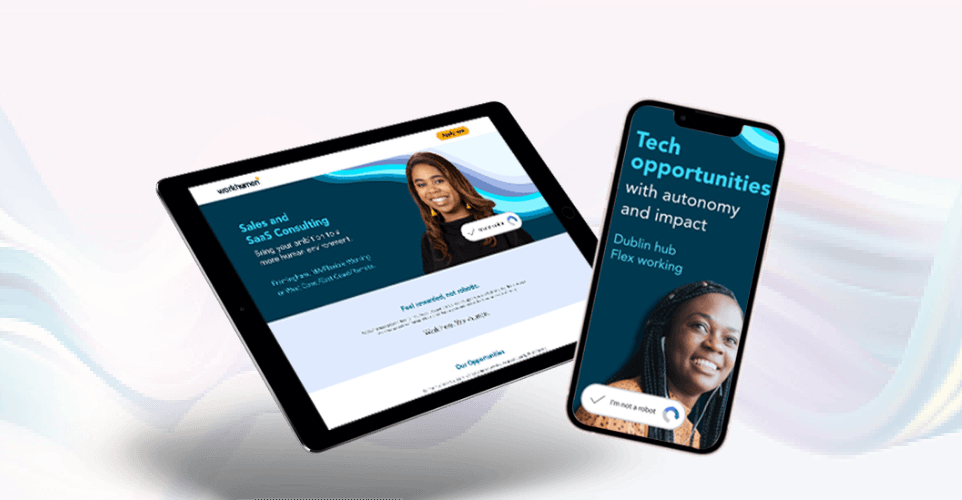The discussion between working from home or returning to the office is definitely nothing new, in fact it’s been going on for the last year or so. With employees embracing a new level of flexibility and proving that they can work successfully from anywhere, working remotely has become highly desirable for some employees and candidates. However, some employees miss the social elements of the office or find it hard to work from home with personal commitments, plus the employers may wish for everyone to be back in the office. Combined, all of these elements means workplaces are torn which is why many are choosing a hybrid approach to working.
A hybrid culture is the term used for having a combination or working from home and from the office, whether employees have a choice of whether they work or have a schedule of days in the office is up to the employer. However, a hybrid culture offers more flexibility and freedom for employees. It’s a modern way of working which fits in with modern attitudes, and therefore employer brands which adopt this are seen as more relevant and enticing to candidates.
For a company to produce a happy, productive, and engaged workforce remotely, organisations will need to leverage an employer brand fit for 2021 and beyond. Your employer brand needs to satisfy basic psychological needs around purpose, impact, and belonging. A 2021 employer brand is all about balancing candidate expectations with the needs of the business. To promote a hybrid culture you need to consider all changing aspects of the business.
However, previously, the office has always been a central hub for company culture and your employer brand. It’s a physical space that represents your business and who you are. The office is where all employees can be together and bounce ideas around or even just have crucial watercooler conversations that make going to work so much more than a job. The office almost becomes a poster for your employer brand and with at least half of the team no longer working from it, this presents some huge challenges for employers.
As hybrid working is set to change the way we work and our attitudes towards the workplace, it’s also set to change the way we view employer brands and how employers can communicate them.
Updating your EVP
While you’re all working for the same company, office work and remote work can be two very different entities. Your Employee Value Proposition (EVP) represents what employees can expect from you as an employer, but as you move to a hybrid strategy this is bound to change. Elements that employers used to include to stand out from the crowd such as Friday drinks or early finishes, may become irrelevant to a large portion of your workforce. Therefore, your EVP needs a rethink.
More than anything, employers need to realise that both employee and candidate expectations are changing and are not the same as they were in 2019. So whether you’re adopting a hybrid strategy or not, you need to rethink your approach to your EVP and employer brand. From what you offer to how you communicate these points internally and externally, as even language preferences are changing. However, if hybrid working is becoming a permanent aspect of your EVP and you’ve decided to give employees this choice, there is more thought and consideration that must be made.
It’s vital that employees who work remotely, whether it’s by choice or forced through geography, feel they have the same experiences and treatment as those in the office. Of course, you can include some office quirks to make the workplace more enjoyable, but they also need to be mirrored for remote teams. If you give preferential treatment to employees in the office, it will create a divisive company culture and your talented people are more likely to consider leaving and joining an organisation where remote working isn’t penalised.
Harder to gain marketing materials
Thinking back to years ago when going into the workplace every day was the norm, it was easy to get social media content and ensure that all team members are at important events or even celebrating a team birthday. As long as you had a camera handy, you could give people a behind the scenes look at your workplace and showcase your team at the same time. All of these snapshot moments helped to paint a picture of your employer brand.
With half of your workforce working away from the office, it’s harder to create recruitment these marketing materials that can promote your employer brand. We all know that telling employee stories and user generated content are great ways to bring your company culture to life and give candidates an insight into what it’s like to work for you; so how do you do this with half of your team working away? You cannot ignore these people or the remote working aspect of your EVP as this could be a crucial driver for new candidates; it needs to be publicised. Plus, leaving them out of these communications will not help them to feel included and valued, which could also impact your employer brand. Therefore, employer branding professionals need to get creative to ensure both sides of the business are celebrated and shared. This may mean thinking outside of the box when it comes to events and going the extra mile to source content, however luckily, with the experience of the pandemic, we’re well versed in virtual events and even long-distance virtual photoshoots.
Losing working relationships
One of the most vital elements of going into the office is forming friendships and relationships that expand beyond work. Small talk is being lost, instead of chatting away at our desks or over lunch, when we’re working remotely the majority of conversations are scheduled calls or at least have a work-related purpose. This may not seem like a huge deal but could have a lasting impact on company culture. We spend most of our lives working so forming these friendships and getting to know your team is a key part of enjoying what you do as well as collaborating and innovating. With some employees working remotely this is becoming much harder and can impact your employer brand. Some employees will be isolated, and others just won’t get the chance to form friendships. Plus, if you schedule days for going into the office, it could be that some team members don’t ever see each other which will make company-wide events a bit strange. HR teams need to find a way to bring these hybrid teams together and ensure that friendships can still be formed. Otherwise office employees could be close knit, remote employees could feel left out and your employer brand will suffer as news of negative experiences breaks.
Onboarding challenges
Then there’s the issue of onboarding. Welcoming and onboarding a new hire is a huge reflection of your employer brand and can be hugely influential in perceptions. A new hire, whether remote or in the office, needs to be shown the ropes and be introduced to people they’ll be working with. In a hybrid team this is a struggle, could there be people they never even get to meet? It’s much easier to onboard an employee when everyone is together as they can get a real feel for the office, learn about people as they work and gain a better understanding of the roles within a team and the personalities too. Take away half of the people or indeed all of them if you new hire is working remotely, and you’re presented with a challenge.
If a new hire doesn’t feel happy, they’ll leave, and they may spread word about your onboarding process and company culture. If you have a high turnover, it’s a red flag to candidates even without online reviews. So therefore, perfecting your onboarding experience means higher retention rates, higher numbers of applicants for future hires and better employer brand perceptions.
Much like your EVP, it’s possible to have a working onboarding process if you become a hybrid workplace, however, it requires thought. You cannot just jump into a mix of remote and office work and expect your employer brand perceptions to remain the same; employee experience must be considered from all perspectives.
The most vital thing to remember when thinking about building and leveraging your employer brand in a hybrid culture is that you are not two separate entities, you are one company. You need to include office workers and remote workers in your communications; this will highlight to candidates that you allow both and they’ll have flexibility but also maintains an inclusive and accepting company. You can’t appear to give preferential treatment to those in the office or those working remotely; this translates through your EVP and the stories that you share to promote your employer brand.
To talk to our experts about building, adapting and promoting your employer brand as you embrace a hybrid approach to work contact us.
Talent Works are experts in employer branding, building EVPs and promoting these messages to relevant audiences through digital attraction campaigns. We use in-depth research to understand both expectations and perceptions of candidates and employees to give you a holistic picture and will create realistic messaging which can be used to raise employer brand awareness as well as advertise specific vacancies.
In a highly competitive talent market, your employer brand is what will make you stand out from the crowd. Ensure yours is relevant and up to date to improve your reputation amongst tech talent.








